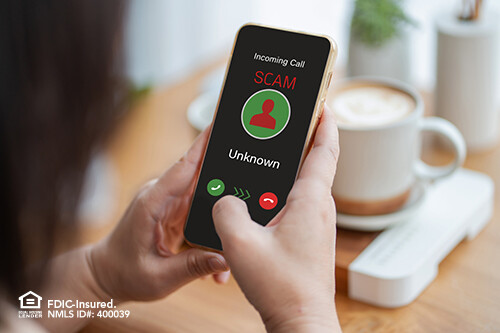Phone call scams are on the rise, targeting innocent people every day. These scams often involve pretending to be reputable organizations, such as banks or government agencies. Scammers employ tactics such as creating a sense of urgency, issuing threats, or offering rewards to deceive their victims.
Identifying these scams is essential for safeguarding your personal information and finances. Spotting red flags in phone call scams can help you prevent becoming a victim.
Understanding these scams and their tactics is the first step in preventing scam calls. Stay informed and vigilant to protect yourself and your loved ones.
Understanding Phone Call Scams
Phone call scams come in many forms, including telemarketing schemes and impersonations. Each type has specific traits meant to trick you. Scammers often pose as representatives from trusted organizations like banks or government agencies.
These criminals try to steal your personal information or money. Understanding how these scams work helps you recognize when something isn't right. Knowledge empowers you to make informed decisions during suspicious calls.
Here are a few common scam types to be aware of:
- Impersonation of financial institutions.
- Government agency fraud.
- Prize or lottery scams.
- Technical support fraud.
Recognizing these scams can protect your personal and financial health. Stay informed to safeguard your sensitive information better.
Common Tactics Used by Scammers
Scammers employ various tactics to deceive their targets. A typical method is to create a sense of urgency, encouraging you to act quickly. They might say your account has been hacked or that you owe money.
Another tactic is offering enticing rewards or prizes. The catch is that you'll need to give personal information or pay a "processing fee." This tactic exploits the desire for unexpected gains.
Threats and emotional manipulation are also frequently used. Scammers may claim a loved one is in danger or pretend to be a distressed acquaintance.
Here are key tactics to watch for:
- Urgency or threats.
- Promises of rewards or prizes.
- Emotional manipulation.
Being aware of these tactics can significantly boost your scam call prevention efforts.
Phone Call Scam Red Flags
Spotting red flags for phone call scams is crucial for your safety. One significant warning sign is when someone asks for personal information. Legitimate organizations will never request your passwords or Social Security number over the phone.
Pressure to make quick decisions is another warning sign. Scammers often don't give you time to think. They demand immediate action to stop you from questioning their legitimacy.
Also, be cautious of unfamiliar area codes or blocked numbers. Caller ID spoofing can make this confusing, but unusual numbers are still a red flag.
Here are some key red flags to watch for:
- Requests for personal information.
- High-pressure tactics.
- Unfamiliar or blocked numbers.
Staying alert to these red flags can help you avoid falling victim to them. Trust your instincts if something doesn't feel right. It's always better to hang up and verify from a trusted source.
The Role of Caller ID Spoofing
Caller ID spoofing is a common tactic used by scammers. It allows them to change the phone number displayed on your caller ID, making a scam call appear to be from a trusted source, such as your bank or a government agency.
Understanding how caller ID spoofing works helps you better recognize scam attempts. When receiving a call, remember that the number you see might not be real.
Key points to know about caller ID spoofing include:
- Scammers hide their real phone numbers.
- Legitimate organizations rarely contact you using these.
- Suspicious numbers often indicate scams.
By staying informed about these tactics, you increase your protection against scams. Be cautious with unexpected calls, even if they seem trustworthy.
Scam Call Prevention: What You Can Do
Taking steps to protect yourself from phone call scams is crucial. Here are practical ways to reduce the risk of becoming a victim.
First, be vigilant with unsolicited calls. If a call seems suspicious, hang up. Verify the caller's identity through official channels.
Use call-blocking technology. Many phones have built-in options to block unknown numbers. Also, consider downloading reputable call-blocking apps.
Here are simple measures you can take:
- Register with the National Do Not Call Registry.
- Regularly update your phone's software.
- Educate yourself on new scam tactics.
Stay cautious with personal information. Sharing too much can make you a target for telemarketing scams. Always think twice before giving out details.
Additional advice includes:
- Report any suspicious calls to the FTC.
- Discuss scam prevention methods with friends and family.
What To Do If You Suspect a Scam Call
If you think a call might be a scam, it's critical to act quickly. Begin by staying calm and composed.
Do not provide any personal or financial information. Legitimate callers won't pressure you into sharing sensitive details over the phone.
Consider these steps when handling suspicious calls:
- End the call without hesitation.
- Verify the caller's claims by contacting the organization directly.
- Document the call details, such as date and time.
These actions help protect you from potential fraud. Remember, caution is your best defense. If instincts tell you something is off, trust that feeling and proceed with care.
Reporting and Educating Others
Reporting scam calls is essential. It helps authorities track and combat these fraudulent activities. Use channels like the Federal Trade Commission (FTC) for filing reports.
Educating others is equally important. Share experiences and tips with family and friends:
- Explain common scam tactics and red flags.
- Discuss scam call prevention methods.
- Encourage vigilance and skepticism towards unknown callers.
By spreading knowledge, we can build a community that's alert and resilient against phone call scams.
Conclusion: Stay Alert, Stay Safe
The increase in phone call scams requires vigilance. Recognizing the tactics and red flags can help you improve your defenses. Always verify suspicious calls and trust your instincts.
Learn about misinformation and share that knowledge with others. Use scam call blockers, such as call-blocking apps and reporting tools, to protect yourself. Remember, staying up to date is the best protection. Constant vigilance and healthy skepticism are key to avoiding fraud. Stay alert to safeguard your personal info and keep your peace of mind.
For more resources, videos, and a quiz to test your scam-spotting skills, visit BanksNeverAskThat.com or nasb.com/security. Share with your loved ones—it could save someone from becoming a victim.




